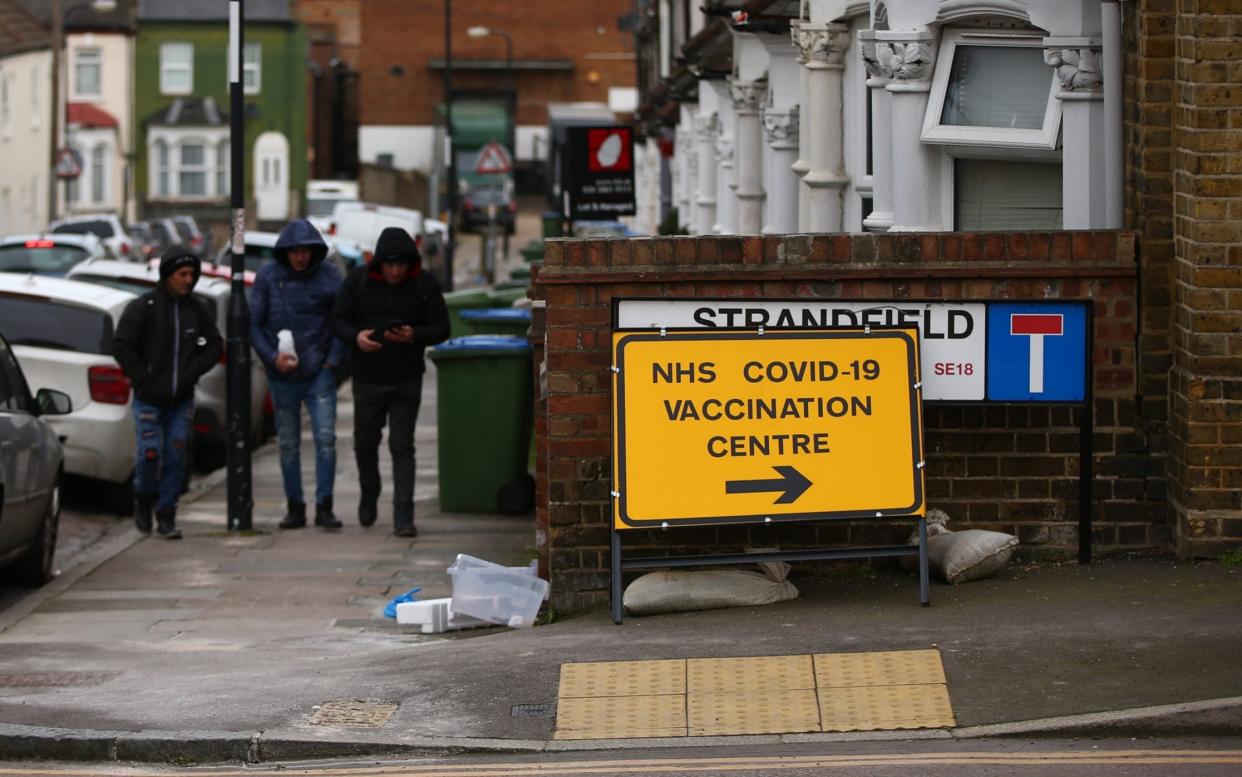GPs offering Covid vaccines to over-50s in postcode lottery

GPs in some areas have begun vaccinating people in their 50s while other parts of the country continue to lag behind amid a continuing postcode lottery for Covid jabs.
It has emerged that some local GP practices have started to contact those in younger age groups. At the same time, som regions are still working their way through the over-70s, raising concerns about geographical variations in the vaccine rollout.
GP practices in Battersea, south London, appear to have moved on to those aged 50 and above, with one 52-year-old "with no underlying health problems" reporting that they had been given a first jab on Tuesday.
There were also unconfirmed reports on social media that some people in their 40s, with no underlying health conditions, have begun receiving the vaccine in other parts of the country.
In response to a Twitter user saying their 52-year-old friend with no underlying health issues had received a jab, another Twitter user wrote: "My friend is 43 and received his jab yesterday with no underlying health issues."
It is thought some areas with smaller elderly populations may have made faster progress in rolling out the vaccination programme than others.
Parts of north London have also seen vaccines rolled out to the over-50s following a large take-up among older groups. One vaccination centre volunteer said: "My shift today was mainly people between 40 and 60. Quite a few of the younger people were amazed that their category had already been reached."
The moves mark a significant step forward in the huge programme to distribute the Covid jabs, showing some areas to be markedly ahead of the Government's target of reaching all priority age groups before the end of April.
To date, at least 15 million people in the UK have received at least one dose. NHS figures show that by Feb 7 around 504,500 in the 50 to 54 age group had received their first dose, although many will have underlying conditions or be on the priority list by reason of occupation such as carers.
The figures also show that 1.9 million people aged under 50 have had the first dose, though again many will have been on priority lists for reasons of health or occupation.
That compares to 2.58 million people aged 80 plus, 1.85 million aged 75-79, two million aged 70-74, 553,000 aged 65-69, 474,000 aged 60-64 and 541,00 aged 55-59.
But some have reacted angrily to the reports that the rollout has already reached younger age groups. One 64-year-old Bournemouth patient who suffers from diabetes said he had "not heard a dickie bird" about when he would receive his first dose.
Rob Salmon, a Cancer Research UK campaigns ambassador, said: "Same here for my partner. People in their early 60s with no health issues have been done, and she's heard nothing. It's no good just shrugging this off – the system must do better."
In some cases, younger patients appear to have been contacted for a vaccination appointment by accident after wrongly appearing on GP lists of the clinically vulnerable or through some unexplained glitch in the system.
Angela Stephens, 48, from Bolton, was contacted to make an appointment for her first vaccination this week despite not being an essential worker or suffering from underlying health issues. She told The Telegraph: "There is no medical reason for me to have the jab ahead of other, older people. All my GP could say was that my name was on a list of people for them to contact."
Mrs Stephens added she would not be going ahead with the vaccination until it was the turn of her age group, saying: "I find it very strange I was invited for an appointment when we have got health workers who have yet to be vaccinated. I'd rather my eldest son got it than me – he's working in a supermarket and coming into contact with lots of people."
A spokesman for the South West London Clinical Commissioning Group, which covers Battersea, said people were in the process of being vaccinated based on the national criteria and that some younger patients would probably have had priority status for reasons of health or occupation.
NHS England said a number of people in their 40s are likely to have been contacted by GPs to be vaccinated at short notice to avoid any unused vaccines being wasted when older people fail to attend jab appointments.
Figures published on Thursday also showed that an estimated 99.3 per cent of people in England aged 75-79 had received a first dose of Covid vaccine by Feb 14. The estimate for people aged 70-74 is 92.3 per cent.
The figure for those aged over 80 is 93.4 per cent across England, although nearly one in five people in that age group in London had yet to have their first dose. Some 94.5 per cent of older residents of care homes in England eligible to have their first dose of a Covid vaccine had received the jab by the same date.

 Yahoo News
Yahoo News 
